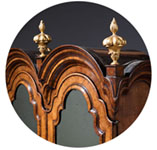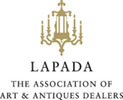17th-Century Diminutive William and Mary Kingwood Strongbox or Coffre Fort, C. 1690.
Sold
Request Information
Follow Us
17th-Century Diminutive William and Mary Kingwood Strongbox or Coffre Fort, C. 1690.
A William and Mary Kingwood/Princes oyster strongbox or Coffre Fort, circa 1680-1700, England. Adorned with highly decorative gilt brass strapwork and decorated entirely in knife cut oysters of kingwood, this box is fit for the most discerning of collectors. The large gilt brass shield-shaped clasp opens on a push-spring release to reveal a box interior lined in rosewood with two drawers and securing bolts.
Once the lid is opened you can reach inside to slide the original gilt brass bolt lock to open the fall. Once the fall is open you will find two drawers lined in walnut divided by a secret compartment.
The box appears decorative, but it was also very difficult to break open or steal. It has a strong lock to the centre and two bolts concealed in the sides, so that it could be screwed down into floorboards if necessary or that of a horse-drawn carriage. Strong-boxes veneered in oysters of Princewood such as this were luxury objects.
The cabinet-makers who would have constructed and veneered the carcase apparently sold them, often using tropical hardwood veneers, and mounted it with sets of mounts, handles and locks bought in from brass founders. The elaborate veneering and conspicuous gilded brass mounts show that the appearance of these objects was important.
Thomas Pistor, of Ludgate Hill, London worked with the renowned cabinetmaker Gerrit Jensen. Gerrit Jensen supplied a walnut-veneered ‘strongbox’ to Colonel James Grahame in 1668, Levens Hall. It is recorded that Thomas Pistor’s remaining stock was sold off post his death in 1711, included ‘three fine Princes wood strongboxes’.
The present example relates almost exactly to a strongbox held in the Victoria & Albert Museum. Accession Number: W.10-1951.
Condition
Good. Wear consistent with age and use. Superb original condition. Fabulous colour.
Dimensions
Height: 8.27 in. (21 cm)
Width: 14.18 in. (36 cm)
Depth: 9.45 in. (24 cm)
PREVIOUSLY SOLD
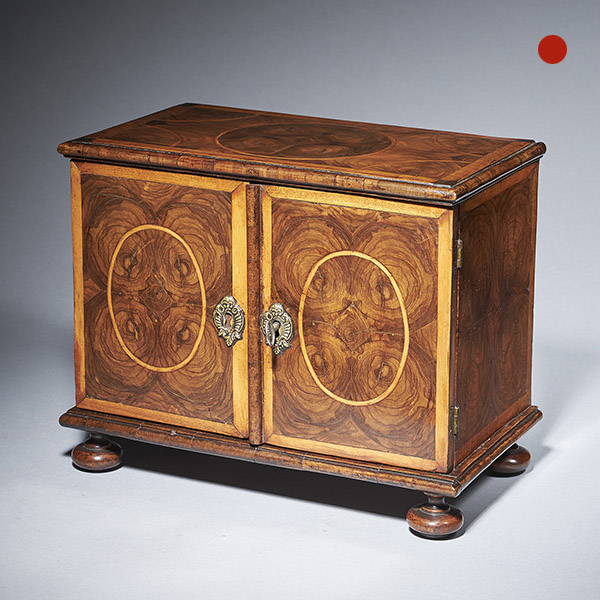
17th-Century miniature table cabinet
The miniature table cabinet opens to an arrangement of drawers, a row of four, a bank of four and a long pen drawer, similarly veneered in oysters of olive.
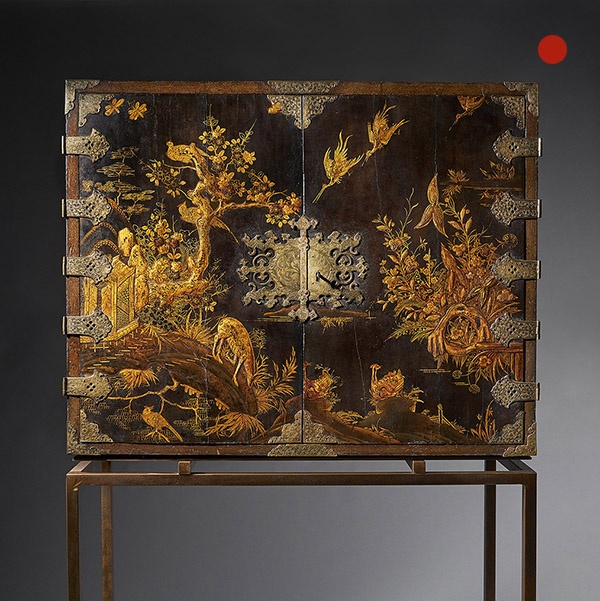
Charles II Japanned Cabinet of exceptional condition c. 1675 raised on a contemporary stand.
Charles II Japanned Cabinet of exceptional condition c. 1675 raised on a contemporary stand SOLD Follow UsCharles II Japanned Cabinet of exceptional condition c. 1675 raised on a contemporary stand An English Charles II Japanned cabinet of...
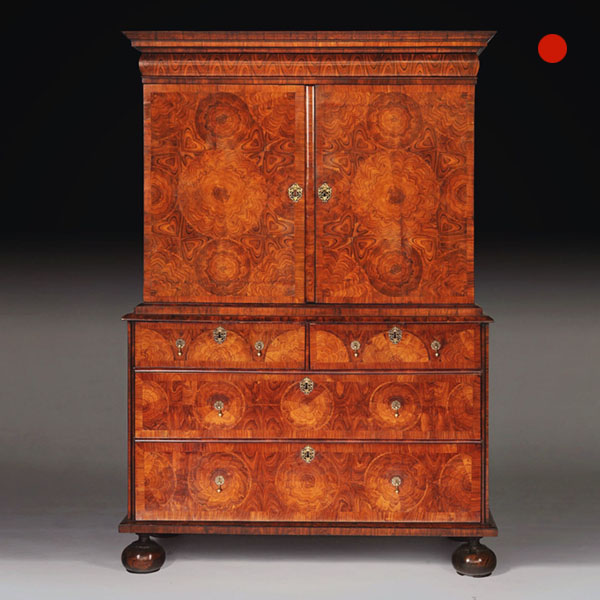
William and Mary Kingwood or ‘Princes’ wood oyster cabinet on chest
When the most expensive timber of the 17th century met Thomas Pistor. There were, in fact, two cabinet-makers called Thomas Pistor, father and son, working for a period at the same time but at different premises. One or both are known to have made furniture of quality for Levens Hall.
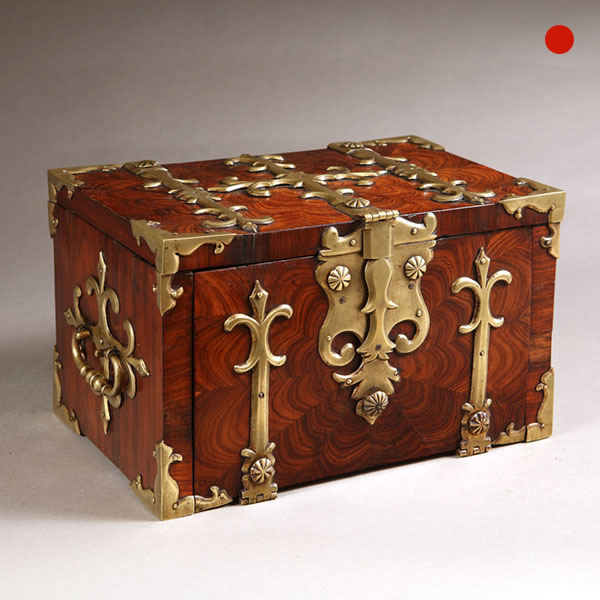
17th Century William and Mary Kingwood Strongbox
A 17th century William and Mary Kingwood strongbox, with gilt brass straps. This strongbox has to be one of the most charming and certainly the smallest example we have encountered, at just 17.5 cm high, 28 cm wide and 18 cm deep. A strongbox of similar merit form and style resides at Burghley House in ‘The 1st George State Room.
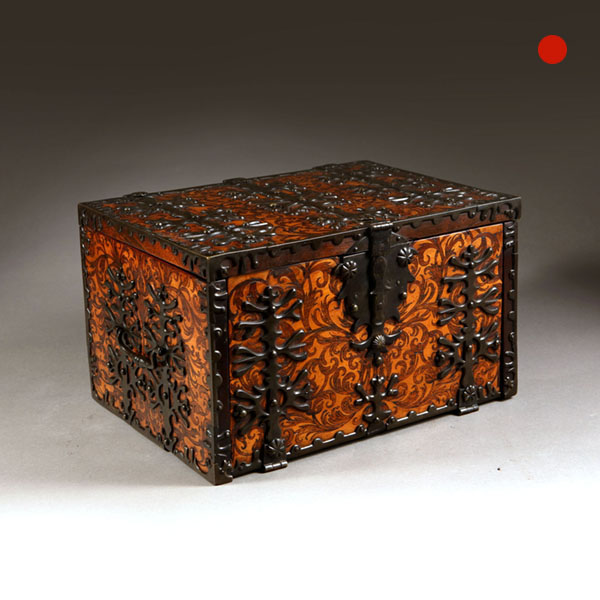
William and Mary Seaweed Marquetry Strong Box Firmly Attributed to Gerrit Jensen
A 17th century William and Mary seaweed or arabesque marquetry strong box, with firm attribution to the royal cabinetmaker, Gerrit Jensen, circa 1680-1700, England.
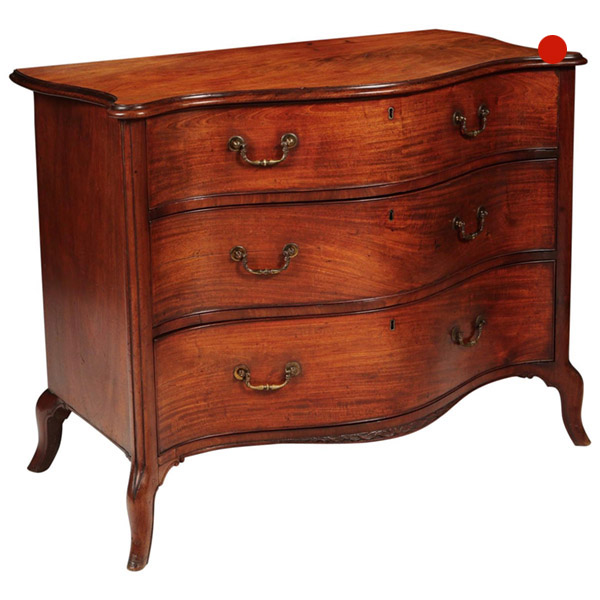
18th Century George III Mahogany Serpentine Chest or Commode
A fine George III mahogany serpentine commode, England, circa 1770. Attributed to Henry Hill, Marlborough. The three graduated drawers retain their original gilt brass handles over a unique carved apron and flanked by moulded angles continuing into the shaped cabriole feet.

17th-Century miniature table cabinet
The miniature table cabinet opens to an arrangement of drawers, a row of four, a bank of four and a long pen drawer, similarly veneered in oysters of olive.

Charles II Japanned Cabinet of exceptional condition c. 1675 raised on a contemporary stand.
Charles II Japanned Cabinet of exceptional condition c. 1675 raised on a contemporary stand SOLD Follow UsCharles II Japanned Cabinet of exceptional condition c. 1675 raised on a contemporary stand An English Charles II Japanned cabinet of...

William and Mary Kingwood or ‘Princes’ wood oyster cabinet on chest
When the most expensive timber of the 17th century met Thomas Pistor. There were, in fact, two cabinet-makers called Thomas Pistor, father and son, working for a period at the same time but at different premises. One or both are known to have made furniture of quality for Levens Hall.

17th Century William and Mary Kingwood Strongbox
A 17th century William and Mary Kingwood strongbox, with gilt brass straps. This strongbox has to be one of the most charming and certainly the smallest example we have encountered, at just 17.5 cm high, 28 cm wide and 18 cm deep. A strongbox of similar merit form and style resides at Burghley House in ‘The 1st George State Room.

William and Mary Seaweed Marquetry Strong Box Firmly Attributed to Gerrit Jensen
A 17th century William and Mary seaweed or arabesque marquetry strong box, with firm attribution to the royal cabinetmaker, Gerrit Jensen, circa 1680-1700, England.

18th Century George III Mahogany Serpentine Chest or Commode
A fine George III mahogany serpentine commode, England, circa 1770. Attributed to Henry Hill, Marlborough. The three graduated drawers retain their original gilt brass handles over a unique carved apron and flanked by moulded angles continuing into the shaped cabriole feet.
YOU MAY ALSO LIKE
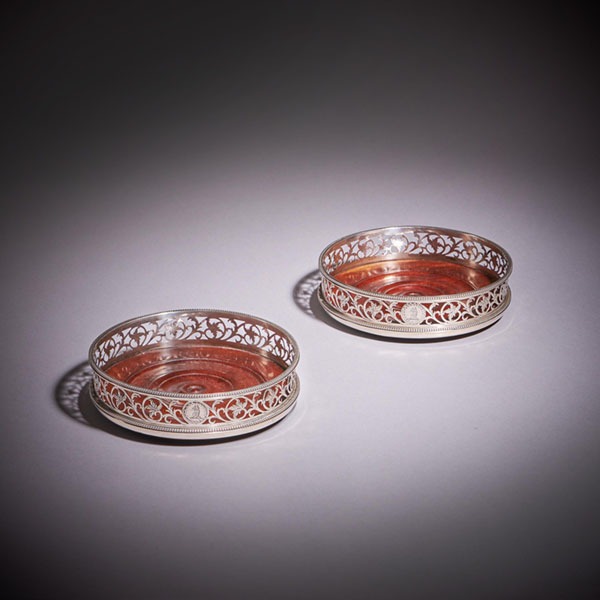
A Fine Pair of 18th Century George III Silver Engraved Open Fret Wine Coasters
A Fine Pair of 18th Century George III Silver Engraved Open Fret Wine Coasters £3,600Follow UsA...
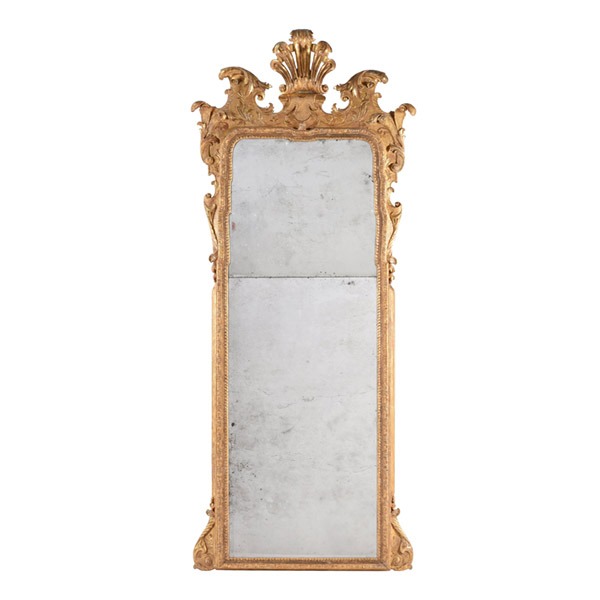
A Large 18th Century George I Gilt-Gesso Pier Glass, Attributed to John Belchier
A Large 18th Century George I Gilt-Gesso Pier Glass, Attributed to John Belchier £42,000Follow UsA...
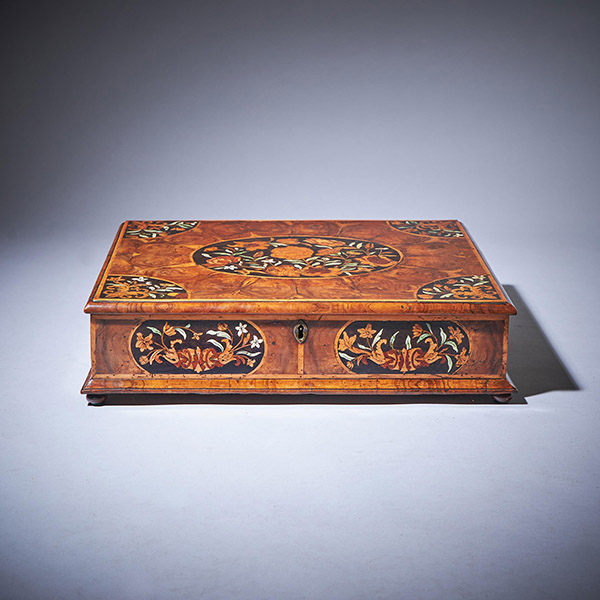
17th Century William and Mary Floral Marquetry Olive Oyster Lace Box, Circa 1685
17th Century William and Mary Floral Marquetry Olive Oyster Lace Box, Circa 1685 £16,000Follow...
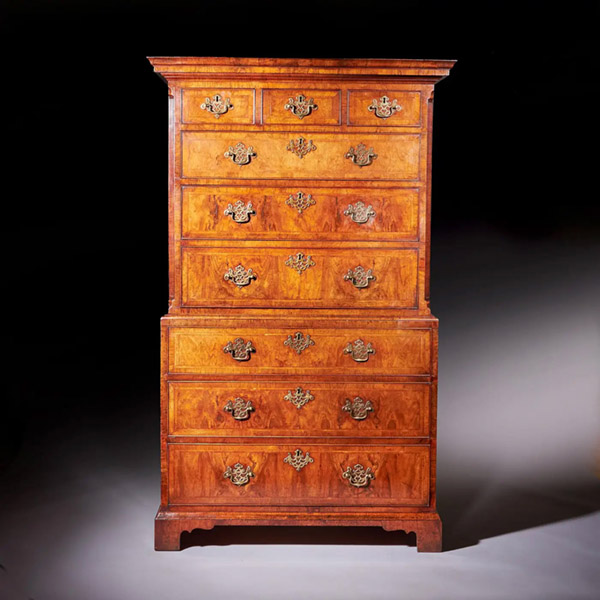
A Fine 18th Century George II Figured Walnut Chest on Chest or Tallboy, 1740
A Fine 18th Century George II Figured Walnut Chest on Chest or Tallboy, 1740 £14,000[wpforms_selector form_id="11387" _builder_version="4.22.1" _module_preset="default" custom_margin="-30px||||false|false" hover_enabled="0"...
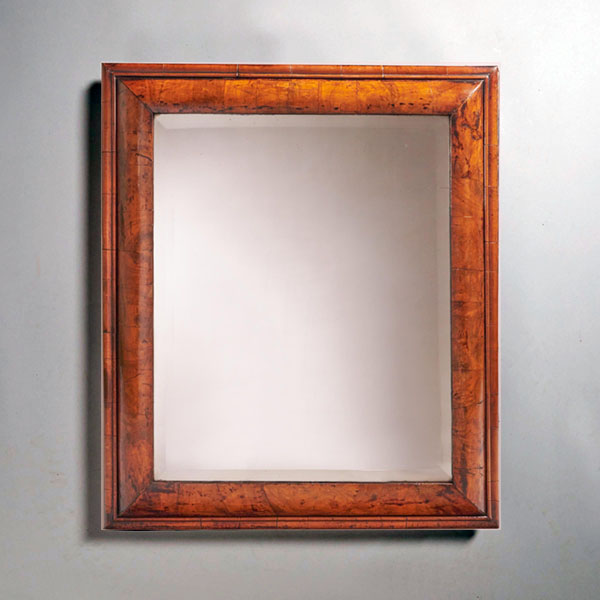
A Fine William and Mary 17th Century Figured Walnut Cushion Mirror C, 1690
A Fine William and Mary 17th Century Figured Walnut Cushion Mirror C, 1690 £6,500Follow UsA Fine William and Mary 17th Century Figured Walnut Cushion Mirror C, 1690 A large William and Mary 17th century figured walnut cushion mirror, circa...
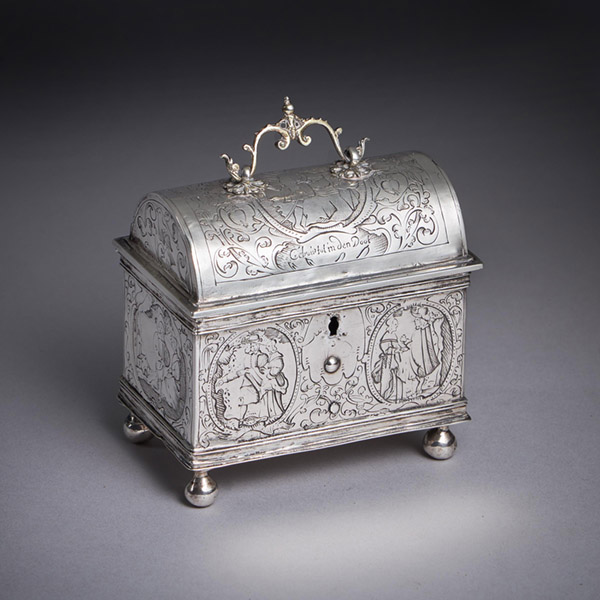
A museum-grade mid-17th century Dutch silver marriage casket or knottekistje, circa 1660
A museum-grade mid-17th century Dutch silver marriage casket or knottekistje, circa 1660 £9,500 [wpforms_selector form_id="11387" show_title="on" _builder_version="4.22.1" _module_preset="default" custom_margin="-30px||||false|false"...

A Fine Pair of 18th Century George III Silver Engraved Open Fret Wine Coasters
A Fine Pair of 18th Century George III Silver Engraved Open Fret Wine Coasters £3,600Follow UsA...

A Large 18th Century George I Gilt-Gesso Pier Glass, Attributed to John Belchier
A Large 18th Century George I Gilt-Gesso Pier Glass, Attributed to John Belchier £42,000Follow UsA...

17th Century William and Mary Floral Marquetry Olive Oyster Lace Box, Circa 1685
17th Century William and Mary Floral Marquetry Olive Oyster Lace Box, Circa 1685 £16,000Follow...

A Fine 18th Century George II Figured Walnut Chest on Chest or Tallboy, 1740
A Fine 18th Century George II Figured Walnut Chest on Chest or Tallboy, 1740 £14,000[wpforms_selector form_id="11387" _builder_version="4.22.1" _module_preset="default" custom_margin="-30px||||false|false" hover_enabled="0"...

A Fine William and Mary 17th Century Figured Walnut Cushion Mirror C, 1690
A Fine William and Mary 17th Century Figured Walnut Cushion Mirror C, 1690 £6,500Follow UsA Fine William and Mary 17th Century Figured Walnut Cushion Mirror C, 1690 A large William and Mary 17th century figured walnut cushion mirror, circa...

A museum-grade mid-17th century Dutch silver marriage casket or knottekistje, circa 1660
A museum-grade mid-17th century Dutch silver marriage casket or knottekistje, circa 1660 £9,500 [wpforms_selector form_id="11387" show_title="on" _builder_version="4.22.1" _module_preset="default" custom_margin="-30px||||false|false"...
